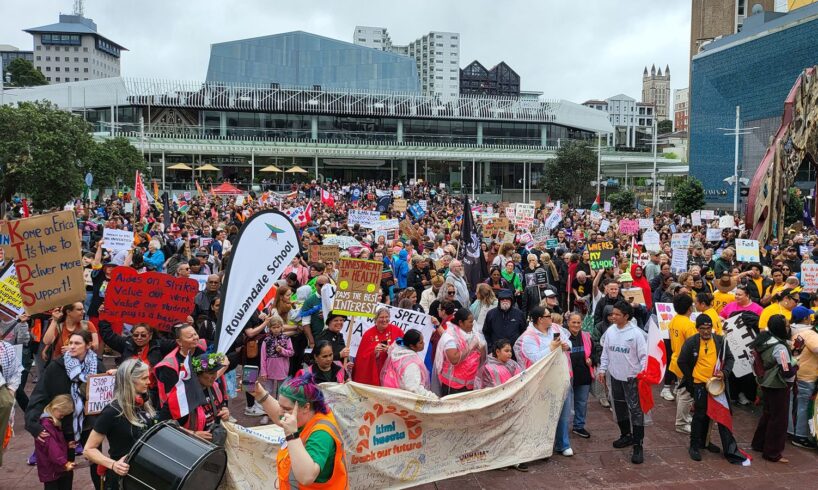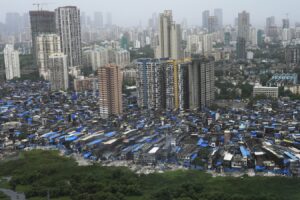
The World Socialist Web Site spoke with several healthcare workers, teachers and supporters during New Zealand’s historic strike on October 23 by more than 100,000 public sector workers. It was the country’s biggest industrial action in more than 40 years and part of an international resurgence of working class struggles.
Mass strike rally in Auckland, October 23, 2025
The workers have rejected attempts by the National Party-led government to impose sweeping pay cuts. They have been offered increases of about 2 percent per year, or less, under conditions where annual inflation is 3 percent and food prices have gone up 4.6 percent in the past year.
The trade union bureaucracy has not organised any further joint strikes and is collaborating with the government and state agencies to settle the disputes as soon as possible, and to channel workers’ anger into votes for the opposition Labour Party in next year’s election.
On Sunday, Public Service Association leader Fleur Fitzsimons—who openly supports the government’s move to double spending on the military—reiterated to Newstalk ZB that the unions were only asking for a deal to match inflation, which would still be a pay cut relative to the real cost of living.
The Socialist Equality Group is holding an online public meeting at 4pm on November 9 to discuss the way forward in the fight against austerity, pay cuts, imperialist war and the threat of dictatorship—in opposition to the pro-capitalist union leaderships and the opposition Labour Party and its allies, which have no real differences with the government.
Workers at the strike rally of more than 15,000 people in Auckland told the WSWS about the appalling conditions they face in public hospitals and schools. Many noted that this was not just the result of actions by the current right-wing coalition government, but that the situation had deteriorated for decades, including under the 2017-2023 Labour-led government.
Pixie, Erinne and Moana
Erinne, a mental health worker, did not think things would be better under Labour, and described the two major parties as “each a wing of the same bird.”
Speaking from more than a decade of working experience, she said “everything in the mental health area” had deteriorated in recent years, including “lack of staffing, homelessness, poverty, increased drug use, transience of people.”
She described the increased homelessness in the town of Rotorua in recent years, saying that following recent cuts to emergency housing “there’s more people on the street, they’re sleeping in the doorfronts, the council are trying to move them on and there’s nowhere for them to go.”
In response to Defence Minister Judith Collins’ comments attacking striking workers for being pro-Palestine, Erinne said the government was “deflecting and distracting people. Yes, there are people here who support Palestine, but we’re all in the same waka [boat], we want what’s best for the people. It’s about being humans and caring.”
She also opposed the government’s claim that it had no money for better wages and conditions, while giving an extra $13 billion to the military over four years. “I’m all for divesting from anything that creates ammunition, weapons, war, that sort of stuff,” she said.
Moana, a social worker at Middlemore Hospital in South Auckland—one of the most impoverished and oppressed parts of the country—said the strike was “about salary but it’s also about safety of the staff and not providing the resources to support our work. How can we be giving quality time to patients when we are having to do a lot more in a small amount of time?”
She explained how poverty was contributing to the crisis in hospitals, saying people “come to the hospital because they can’t afford a GP, and that’s when emergency care drops in quality because you can’t care for them, because there’s too many coming through.”
Pixie, who also works at Middlemore, said Health Minister Simeon Brown’s statement that the strike was being driven by the unions, and not the workers themselves, was false. “We’re doing this because we think it’s right, as the people,” she said.
She pointed out that a record 73,000 people had left the country permanently in the past year, most of them moving to Australia in search of better living standards.
Pixie also noted that homelessness and the lack of mental healthcare were major problems. “Around Middlemore Hospital it’s not unusual to see people sitting around on the outside just in case they get sick. The mental health system is unable to take them in, so where do they go? The street.”
Hannah, a mental health nurse with 18 years’ experience, told the WSWS she felt “consistently unsafe. Staff are being physically harmed, assaulted, punched, strangled. There’s constant short-staffing. When rosters are down, they don’t replace staff.
“It’s really upsetting to come to work and feel like you’re there to do something to help people and it’s very limited. You’re just putting out fires. I’ve been a nurse in mental health for 18 years and it’s progressively gotten worse. But since this government’s come in, it’s never been anywhere like it is now.”
She expressed frustration with the pay bargaining process, saying that the representatives of the state were “not the people who can change anything” so “it doesn’t seem to be an honest and genuine approach.” Hannah added that a 3 percent pay rise “is not going to make up for inflation.”
Striking workers marching on Auckland’s Queen Street, October 23, 2025.
Monique, who has been a teacher for three years, said her workload “is way beyond what ordinary people would imagine.” It “extends well beyond the school day. You’ve got to prepare before you get to work, and then you’ve got to work after work. The sheer number of students you have to cater for, and the complexity of their needs, is overwhelming.”
Jason, a secondary teacher in the Wellington region, told the WSWS that the issues facing schools included class sizes and students living in poverty. “It impacts their ability to get to school. If there’s no money for the train or bus, they become reliant on walking, sometimes quite a long way. Poverty has a massive impact on a home, it affects kids’ emotional life, how people stay together or don’t stay together.”
Jason said the government’s claims that it had no money for substantial pay rises and to address the crisis in schools was “total spin. They’re extracting everything they can out of us, they’re viewing us as a population that they can make work to produce excessive wealth.
“And then they’re going to ask us to commit our children for some sort of war, it’s upsetting, it’s very upsetting. They’ll always find money for wars.”
Asked about the government’s attack on the strike for being pro-Palestine, Jason said: “I’m quite happy for it to be about Palestine. I’m sick of working for a government that is supporting genocide. I’m really unhappy about it. It makes it hard to go to work. Our teenagers know what’s going on over there. Most of them have got some idea. They’re looking at grown-ups to see how I should react to this, what should I do? Should I just act like nothing’s happening?
“For Judith Collins to make a comment like that, what she’s saying is it’s not okay to disagree with the government’s stance on genocide, that is, on Palestine. If we choose to have an opinion about it, we absolutely have the right to have an opinion about it, and I think we should have the right to strike about it.”
Sign up for the WSWS Educators Newsletter
Receive news and information on the fight against layoffs and budget cuts, and for the right to free, high-quality public education for all.





